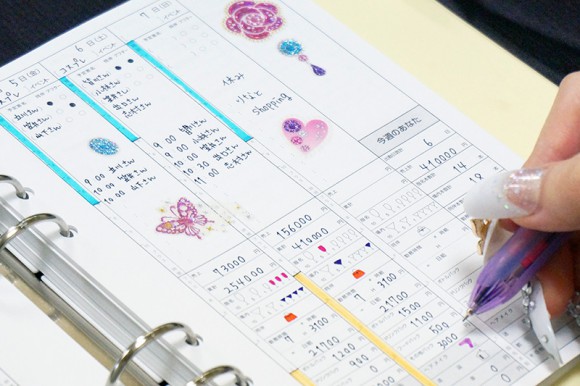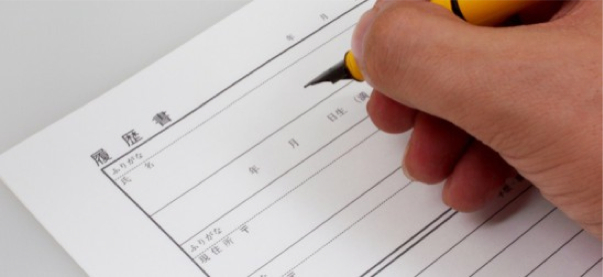For the past six years, I’ve made a point of buying myself a little Rilakkuma daily planner each January and using it to keep track of my appointments, deadlines, to-do lists, etc. These kinds of daily planners are widely used in Japan, perhaps as a result of the Japanese love of punctuality and efficiency (or maybe they’re so punctual and efficient because everyone uses daily planners?) Sure, you could use the functions built into your smartphone or tablet, but there’s something about writing things down that just makes you feel like you’ve got it all together. Also, and this is kind of geeky, but it’s sorta fun to flip through your old schedule books and see what you were up to on x date 3 years ago. In fact, Japan loves schedule books so much that you can now choose from a huge range of styles which are tailor-made to cater to specific lifestyles. Whether you’re a hostess, train otaku or exam-cramming student, there’s a schedule book out there for you!
shuukatsu
Traditionally, Japanese resumes are handwritten on a special form. Recently, however, typed resumes are becoming more common – and one recruiter is not happy about this. Writing anonymously on Japanese website Hatelabo, the blogger, who works for a chain restaurant in Japan and is involved in recruitment, sets out his reasons for why an applicant who submits a typewritten resume should be the first to find their application on the “no” pile.
“You young people, don’t you have any common sense?” he asks of applicants with the typed resumes. “Are you crazy? In my day, this would have been unimaginable!” Let’s take a look at the pros and cons of the handwritten CV.


 Red light district sushi restaurant in Tokyo shows us just how wrong we were about it
Red light district sushi restaurant in Tokyo shows us just how wrong we were about it Tokyo Tsukiji fish market site to be redeveloped with 50,000-seat stadium, hotel, shopping center
Tokyo Tsukiji fish market site to be redeveloped with 50,000-seat stadium, hotel, shopping center Japanese ramen restaurants under pressure from new yen banknotes
Japanese ramen restaurants under pressure from new yen banknotes McDonald’s new Happy Meals offer up cute and practical Sanrio lifestyle goods
McDonald’s new Happy Meals offer up cute and practical Sanrio lifestyle goods Beautiful Red and Blue Star luxury trains set to be Japan’s new Hokkaido travel stars
Beautiful Red and Blue Star luxury trains set to be Japan’s new Hokkaido travel stars Pokémon Sleep camping suite and guestrooms coming to Tokyo Hyatt along with giant Snorlax burgers
Pokémon Sleep camping suite and guestrooms coming to Tokyo Hyatt along with giant Snorlax burgers Osaka’s creepy cute mascot speaks for first time, adds more fuel the creepy OR cute debate【Video】
Osaka’s creepy cute mascot speaks for first time, adds more fuel the creepy OR cute debate【Video】 French Fries Bread in Tokyo’s Shibuya becomes a hit on social media
French Fries Bread in Tokyo’s Shibuya becomes a hit on social media Mt. Koya planning to instate visitor’s tax to cope with huge tourist numbers
Mt. Koya planning to instate visitor’s tax to cope with huge tourist numbers Starbucks Japan adds a Motto Frappuccino to the menu for a limited time
Starbucks Japan adds a Motto Frappuccino to the menu for a limited time All-you-can-drink Starbucks and amazing views part of Tokyo’s new 170 meter-high sky lounge
All-you-can-drink Starbucks and amazing views part of Tokyo’s new 170 meter-high sky lounge More foreign tourists than ever before in history visited Japan last month
More foreign tourists than ever before in history visited Japan last month Studio Ghibli releases new action figures featuring Nausicaä of the Valley of the Wind characters
Studio Ghibli releases new action figures featuring Nausicaä of the Valley of the Wind characters New private rooms on Tokaido Shinkansen change the way we travel from Tokyo to Kyoto
New private rooms on Tokaido Shinkansen change the way we travel from Tokyo to Kyoto Starbucks reopens at Shibuya Scramble Crossing with new look and design concept
Starbucks reopens at Shibuya Scramble Crossing with new look and design concept Studio Ghibli glasses cases let anime characters keep an eye on your spectacles
Studio Ghibli glasses cases let anime characters keep an eye on your spectacles Beautiful Ghibli sealing wax kits let you create accessories and elegant letter decorations【Pics】
Beautiful Ghibli sealing wax kits let you create accessories and elegant letter decorations【Pics】 Studio Ghibli releases Kiki’s Delivery Service chocolate cake pouches in Japan
Studio Ghibli releases Kiki’s Delivery Service chocolate cake pouches in Japan New definition of “Japanese whiskey” goes into effect to prevent fakes from fooling overseas buyers
New definition of “Japanese whiskey” goes into effect to prevent fakes from fooling overseas buyers Our Japanese reporter visits Costco in the U.S., finds super American and very Japanese things
Our Japanese reporter visits Costco in the U.S., finds super American and very Japanese things Studio Ghibli unveils Mother’s Day gift set that captures the love in My Neighbour Totoro
Studio Ghibli unveils Mother’s Day gift set that captures the love in My Neighbour Totoro New Japanese KitKat flavour stars Sanrio characters, including Hello Kitty
New Japanese KitKat flavour stars Sanrio characters, including Hello Kitty New Pokémon cakes let you eat your way through Pikachu and all the Eevee evolutions
New Pokémon cakes let you eat your way through Pikachu and all the Eevee evolutions Disney princesses get official manga makeovers for Manga Princess Cafe opening in Tokyo
Disney princesses get official manga makeovers for Manga Princess Cafe opening in Tokyo Sales of Japan’s most convenient train ticket/shopping payment cards suspended indefinitely
Sales of Japan’s most convenient train ticket/shopping payment cards suspended indefinitely Sold-out Studio Ghibli desktop humidifiers are back so Totoro can help you through the dry season
Sold-out Studio Ghibli desktop humidifiers are back so Totoro can help you through the dry season Japanese government to make first change to romanization spelling rules since the 1950s
Japanese government to make first change to romanization spelling rules since the 1950s Ghibli founders Toshio Suzuki and Hayao Miyazaki contribute to Japanese whisky Totoro label design
Ghibli founders Toshio Suzuki and Hayao Miyazaki contribute to Japanese whisky Totoro label design Doraemon found buried at sea as scene from 1993 anime becomes real life【Photos】
Doraemon found buried at sea as scene from 1993 anime becomes real life【Photos】 Tokyo’s most famous Starbucks is closed
Tokyo’s most famous Starbucks is closed One Piece characters’ nationalities revealed, but fans have mixed opinions
One Piece characters’ nationalities revealed, but fans have mixed opinions We asked a Uniqlo employee what four things we should buy and their suggestions didn’t disappoint
We asked a Uniqlo employee what four things we should buy and their suggestions didn’t disappoint Princesses, fruits, and blacksmiths: Study reveals the 30 most unusual family names in Japan
Princesses, fruits, and blacksmiths: Study reveals the 30 most unusual family names in Japan Pokémon Sleep camping suite and guestrooms coming to Tokyo Hyatt along with giant Snorlax burgers
Pokémon Sleep camping suite and guestrooms coming to Tokyo Hyatt along with giant Snorlax burgers Osaka’s creepy cute mascot speaks for first time, adds more fuel the creepy OR cute debate【Video】
Osaka’s creepy cute mascot speaks for first time, adds more fuel the creepy OR cute debate【Video】 French Fries Bread in Tokyo’s Shibuya becomes a hit on social media
French Fries Bread in Tokyo’s Shibuya becomes a hit on social media Mt. Koya planning to instate visitor’s tax to cope with huge tourist numbers
Mt. Koya planning to instate visitor’s tax to cope with huge tourist numbers Starbucks Japan adds a Motto Frappuccino to the menu for a limited time
Starbucks Japan adds a Motto Frappuccino to the menu for a limited time Kyoto’s 100 Demons yokai monster parade returns!
Kyoto’s 100 Demons yokai monster parade returns! New private rooms on Tokaido Shinkansen change the way we travel from Tokyo to Kyoto
New private rooms on Tokaido Shinkansen change the way we travel from Tokyo to Kyoto Own a pair of secret camera shoes? The police should be by shortly for a visit
Own a pair of secret camera shoes? The police should be by shortly for a visit Century-old Hiroshima brewery in one of Japan’s three great sake-brewing spots offers tours in English
Century-old Hiroshima brewery in one of Japan’s three great sake-brewing spots offers tours in English When is the right time for a love confession in Japan?
When is the right time for a love confession in Japan? Details of the Pokémon/Van Gogh art museum crossover are just as adorable as we’d hoped【Pics】
Details of the Pokémon/Van Gogh art museum crossover are just as adorable as we’d hoped【Pics】 History’s worst job? Japanese noblewomen used to hire servants to take the blame for their farts
History’s worst job? Japanese noblewomen used to hire servants to take the blame for their farts